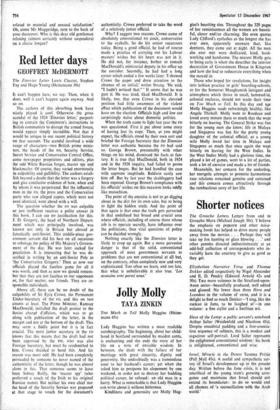Red letter days
GEOFFREY McDERMOTT
The Zinoviev Letter Lewis Chester, Stephen Fay and Hugo Young (Heinemann 30s) It can't happen here, we say. Then, when it does, well it can't happen again anyway. And so on.
The authors of this absorbing book have wisely played it cool. Otherwise the gross scandal of the 1924 'Zinoviev letter,' purport- ing to contain the Comintem's instructions to British communists to disrupt the armed forces, would appear simply incredible. Not that it would be unique in our recent political history on that account. The scandal involved a wide range of characters—two British prime minis- ters, the heads of the FO, Security Servic:e, Secret Service and Conservative Central Office, some newspaper proprietors and editors, plus the odd White Russian forger, master spy and blackmailer. Of course, they varied enormously in culpability and gullibility. The authors estab- lish beyond a doubt that the letter was a forgery and give conclusive evidence of how, when and by whom it was perpetrated. But the influential men in the FO, the press and the Conservative party who saw alleged copies, whiCh were not even identical, went ahead with a will.
The question whether the Fo was culpable or just inefficient receives a polite answer in this book. I can see no justification for this. J. D. Gregory, the head of Northern Depart7 ment which was principally involved, was known not only in Britain but abroad as fanatically anti-Soviet. This middle-piece gov- ernment servant did his best on all occasions to sabotage the policy of His Majesty's Govern- ment
of the day. He was later sacked for peculation. It is interesting that he was de- scribed in writing by an anti-Soviet Pole as `the Conservative Gregory.' Then as now our officials played the faceless game for all it was worth, and then as now we should remem- ber that they are not faceless to our opponents or, for that matter, our friends. They are re- sponsible individuals.
Above all, there can be no doubt of the culpability of Sir Eyre Crowe, the Pernianent Under-Secretary of the FO, and this on two counts at least. The Prime Minister, Ramsay MacDonald, initialled the draft protest to the Soviet chargé d'affaires, which was to go along with publication of the letter, in the margin and not at the bottom of the draft. This may seem a fiddly point but it is in fact crucial. The most junior secretary in the FO knows that this means that the draft had not been approved by the PM, who was alsci Foreign Secretary, but must be resubmitted to him. Crowe decided to bend this. And his reason was most odd. He had been completely persuaded by someone he never named of the authenticity of the letter, though he was almost alone in this. That someone seems to have been Sidney Reilly, the 'master spy' (who preferred a touch of the Irish to his original Russian name). But neither his own chief nor the head of -the Security Service was prepared, at that stage to vouch for the document's
authenticity. Crowe preferred to take the word of a relatively junior officiaL
Why? I suggest two reasons. Crowe came of absolutely conventional FO stock, conservative to the eyeballs. So - do his senior successors today. Being a good official, he had of course made a practice of carrying out his Labour , masters' wishes but his heart was not in it. He did not, for instance, bother to consult MacDonald's ministerial deputy in his office up the corridor. Secondly, he had had a long career which ended a few weeks later. 'I Showed Crowe the paper and drew attention to the absence of an initial,' writes Strang. 'He said, "I hadn't noticed that ' It seems that he was past it. He was tired, liked MacDonald. It is likely, too, that even Crowe in his elevated position had little awareness of the violent effect which publication of the document would have on the election. Officials high and low are surprisingly naive about domestic politics.
When the truth came to light last year the FO was questioned. First it put about some story of having lost its copy. Then, as you might expect, the officials stood by their own sort and briefed the Foreign Secretary that the Zinoviev letter was authentic because the FO had said so. George Brown, presumably with other things on his mind, dismissed the facts as fan- tasy. It is true that MacDonald, both in 1924 and in the 1928 inquiry, had failed to prove the letter bogus. But he had handled the case with supreme ineptitude. Baldwin easily saw him off. But by last year the skulduggery had been exposed. George Brown's compliance with his officials' wishes on this occasion looks oddly like masochism.
The point of the exercise is not to go digging about in the dirt for its own sake, but to bring to light the hidden truth. And the point of that again is that once the truth gets perverted in that undefined but broad and crucial area where officials, including of course those whose job is to operate secretly, have influence over the politicians, then vital questions of policy can be decided wrongly.
Nothing exactly like the Zinoviev letter is likely to crop up again. But a more pervasive danger is that of the solid, conventional approach of most government servants, to problems that are not conventional at all but, on the contrary, often completely new and very sophisticated. Too often we learn, and too late, that what_ is unbelievable is also true. 'Les assassins sont parmi nous.'


































 Previous page
Previous page